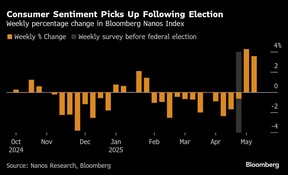Canadian consumer confidence rises after Carney’s election win, polling shows
The index is now at 48.6. A reading below 50 still indicates negative views, but it’s the highest in nine weeks

Article content
Canadians are growing more optimistic about the economy, as the conclusion of a national election relieves some anxiety around the country’s direction and U.S. President Donald Trump’s threats.
The Bloomberg Nanos Canadian Confidence Index, a measure of sentiment based on weekly polling, has improved since Prime Minister Mark Carney’s Liberals won their fourth term at the end of April. The index is now at 48.6. A reading below 50 still indicates negative views, but it’s the highest in nine weeks.
About 16% of respondents believe the Canadian economy will strengthen over the next six months, up from around 10% at the beginning of April. However, the balance of views on that question is still decidedly bearish: 55% think the economy will weaken.
The confidence index dropped into negative territory after Trump’s election on Nov. 5, and has stayed there for much of this year. But the election closed a chapter of political uncertainty in Canada that began with Justin Trudeau’s announcement on Jan. 6 that he would resign as prime minister and Liberal leader. About 8.6 million Canadians voted for Carney’s party after he promised to win the trade war with the US.

The rise in optimism also coincides with a more hopeful period for markets, with the S&P/TSX Composite Index on a five-week winning streak.
Last week, Carney met Trump at the White House for the first time. The prime minister told reporters they “established a good basis” for future talks, while Trump said the meeting went “very well.” Still, US import taxes remain on Canadian autos, steel, aluminum and other products, as do Canada’s counter-tariffs on American goods.
The optimism may be short-lived if the trade war is prolonged or worsens. Tariffs have weighed on Canada’s economy, contributing to a rise in the unemployment rate to 6.9% last month from 6.6% in January. Some export-dependent firms have paused hiring or operations, and workers in some sectors are increasingly worried about losing their jobs.
About 14% of respondents in the Bloomberg Nanos poll said they feel their jobs aren’t secure, versus about 63% who believe theirs are. Some 42% said their finances have gotten worse over the past year.
Every week, Nanos Research surveys 250 Canadians for their views on job security, personal finances, the economy and real estate prices. Bloomberg publishes four-week rolling averages of the 1,000 responses. The poll has a margin of error of about 3 percentage points, 19 times out of 20.











Postmedia is committed to maintaining a lively but civil forum for discussion. Please keep comments relevant and respectful. Comments may take up to an hour to appear on the site. You will receive an email if there is a reply to your comment, an update to a thread you follow or if a user you follow comments. Visit our Community Guidelines for more information.